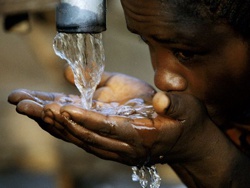Conflicting government policies are to blame for the country's water shortages, according to civil society organisations.
"In our opinion, Ghana is not reaping the full benefits of her huge water resource potential because policy contradictions of the government have led to poor water resource management," according to a statement issued by the Centre for Environmental Impact Policy Analysis (CEIA), Wacam, the Gender and Environmental Monitoring Adovcates (GEMA0 and Humanity Focus Foundation (HFF) have argued.
The statement was issued to coicide with World Water Day last Friday.
In it, the groups said government policies interfere with the environment, leading to the destruction of precious water bodies which could be harnessed to provide water for the country.
"The decision of the government to open up forest reserves for mining operations meant the sanctioning of the destruction of watersheds and, by extension, the killing of rivers and water bodies," the report said.
The cited government's granted mining lease to Newmont Gold Ghana Limited's Akyem Mine to undertake surface mining in the Ajuena-Bepo Forest Reserve, which is the watershed for rivers such as Yaayaa, Adenkyensu, Alotosu, Afosu, Aprapon and Owunta.
They said that the current government is responsible for the situation since Ghana has a progressive political system which makes the present administration responsible for the decisions of the past one.
Even so, the groups said it recognises the need for private organisations to work with the government in order to secure the nation against experts' predictions that Ghana will face a severa water crisis by 2025.
Ghana is already facing a severe water shortage due to pollution of water bodies, poor infrastructure and management in the water sector and countrywide power problems.
General News of Monday, 25 March 2013
Source: Public Agenda
Gov't policies to blame for water shortages













